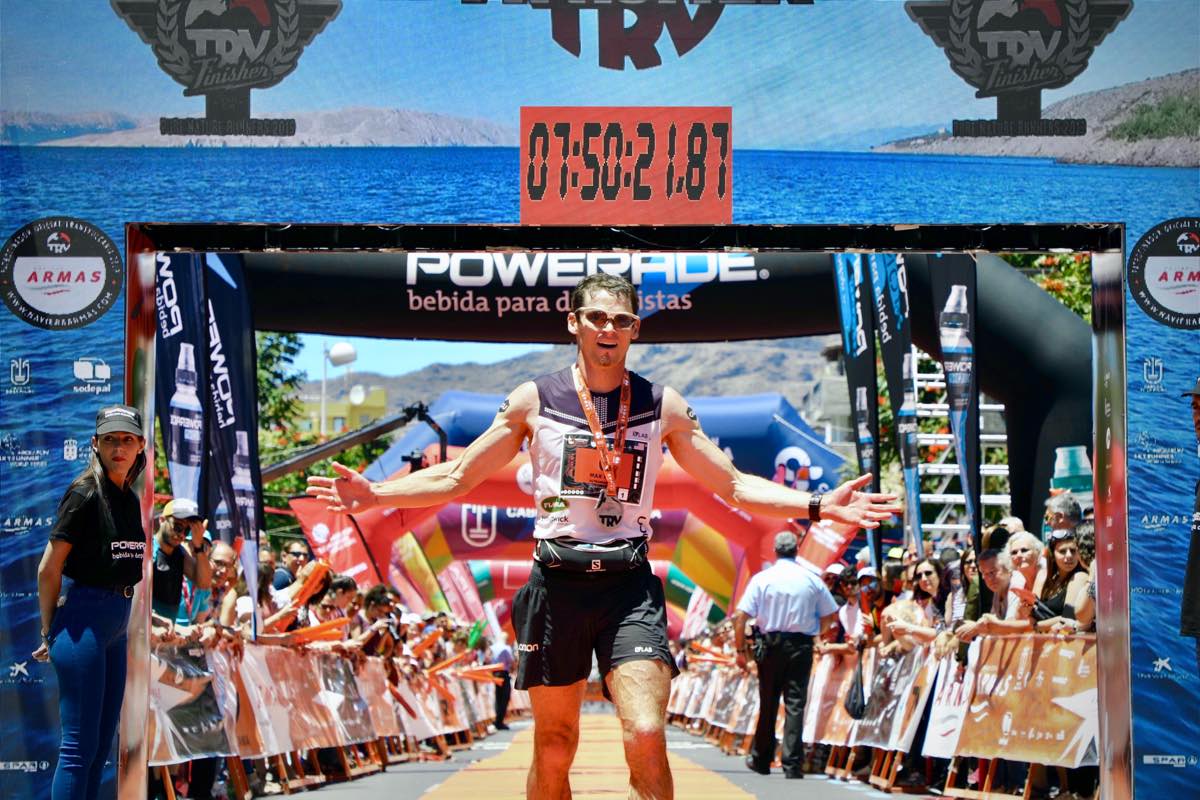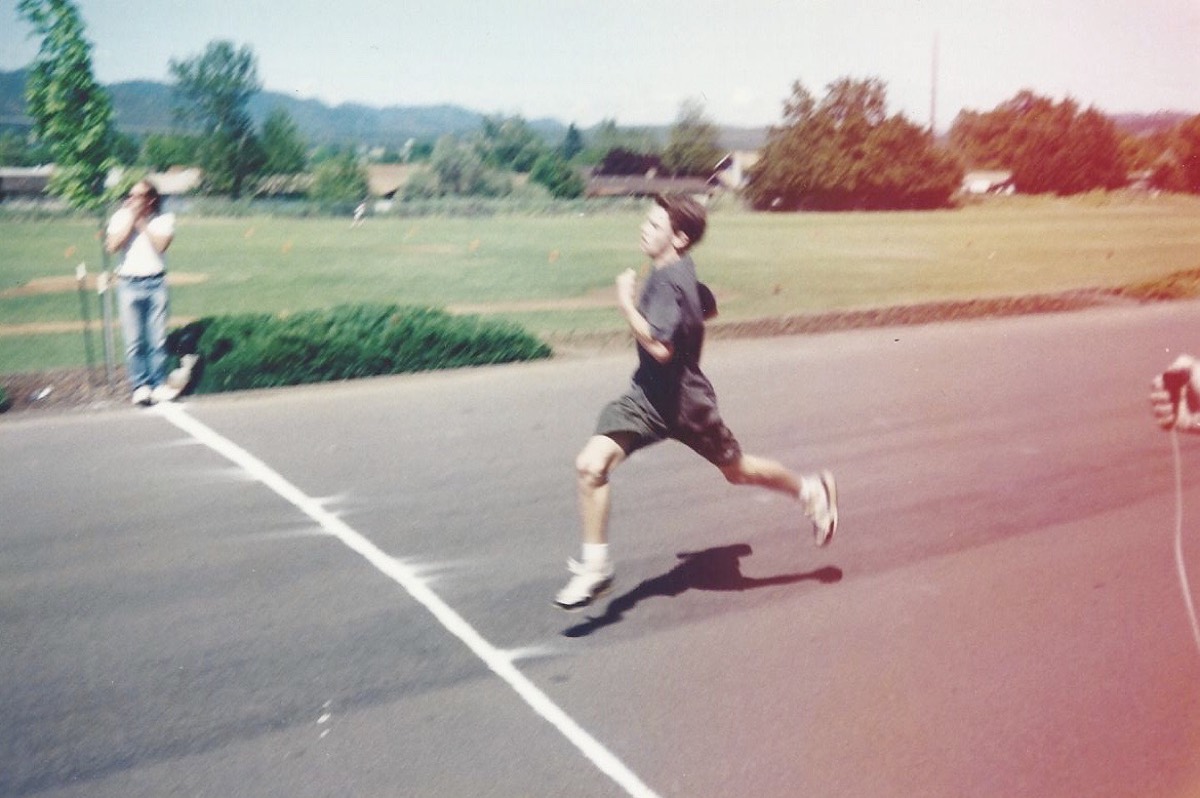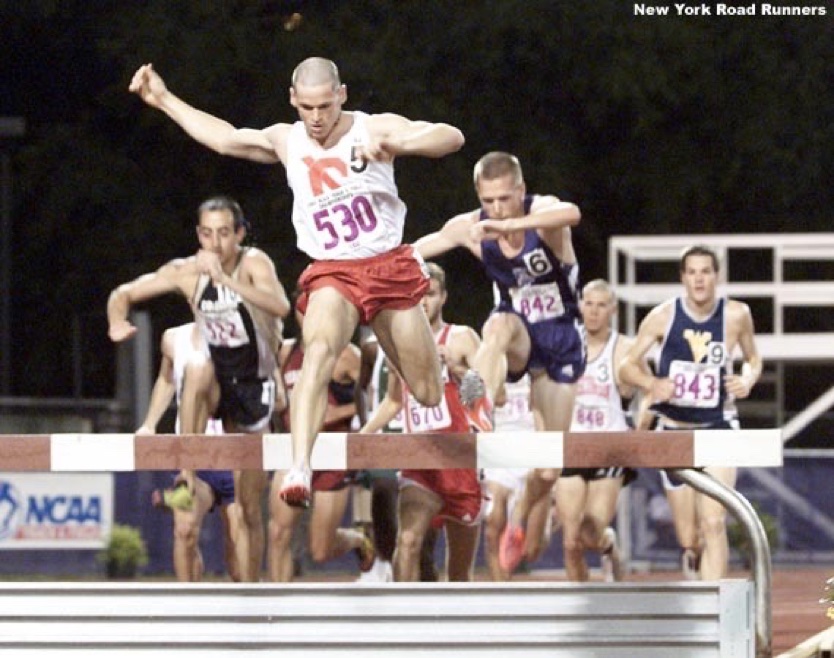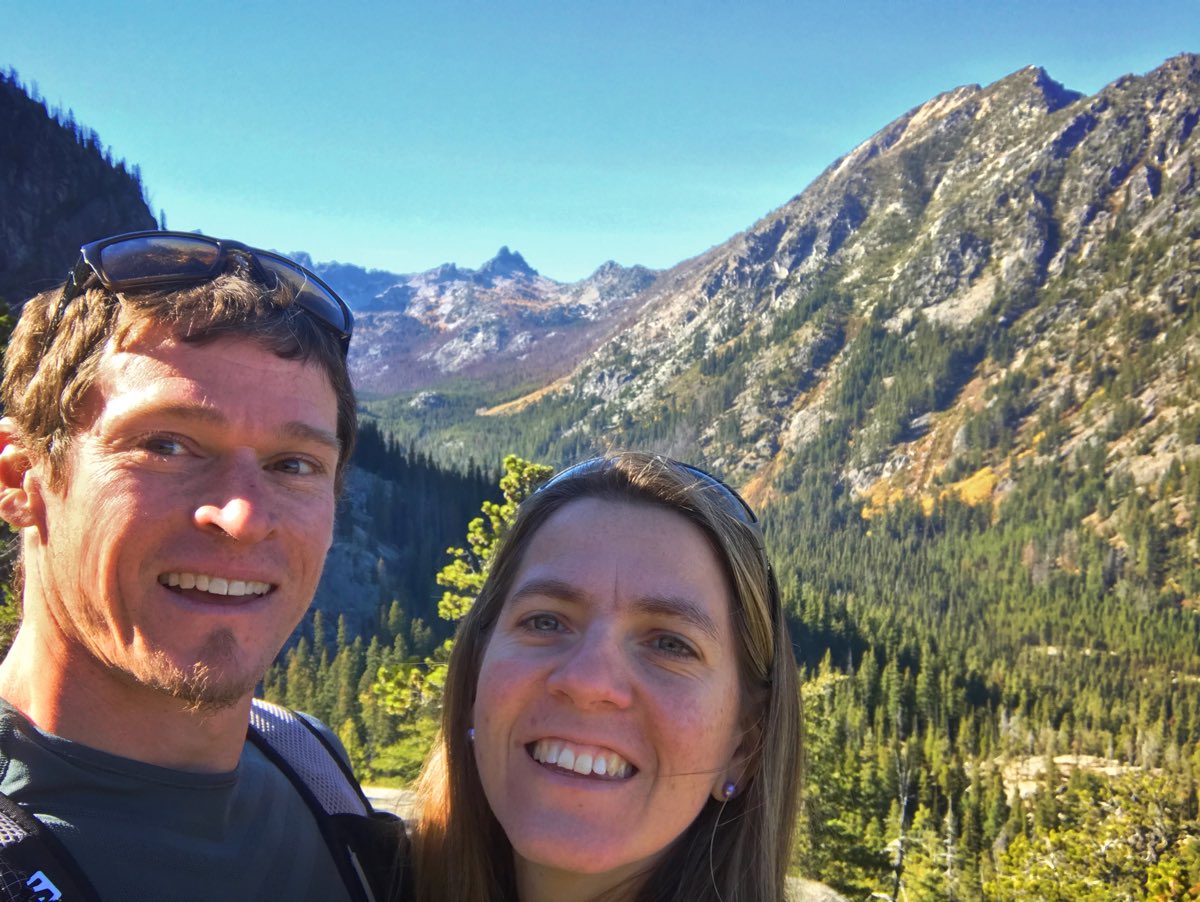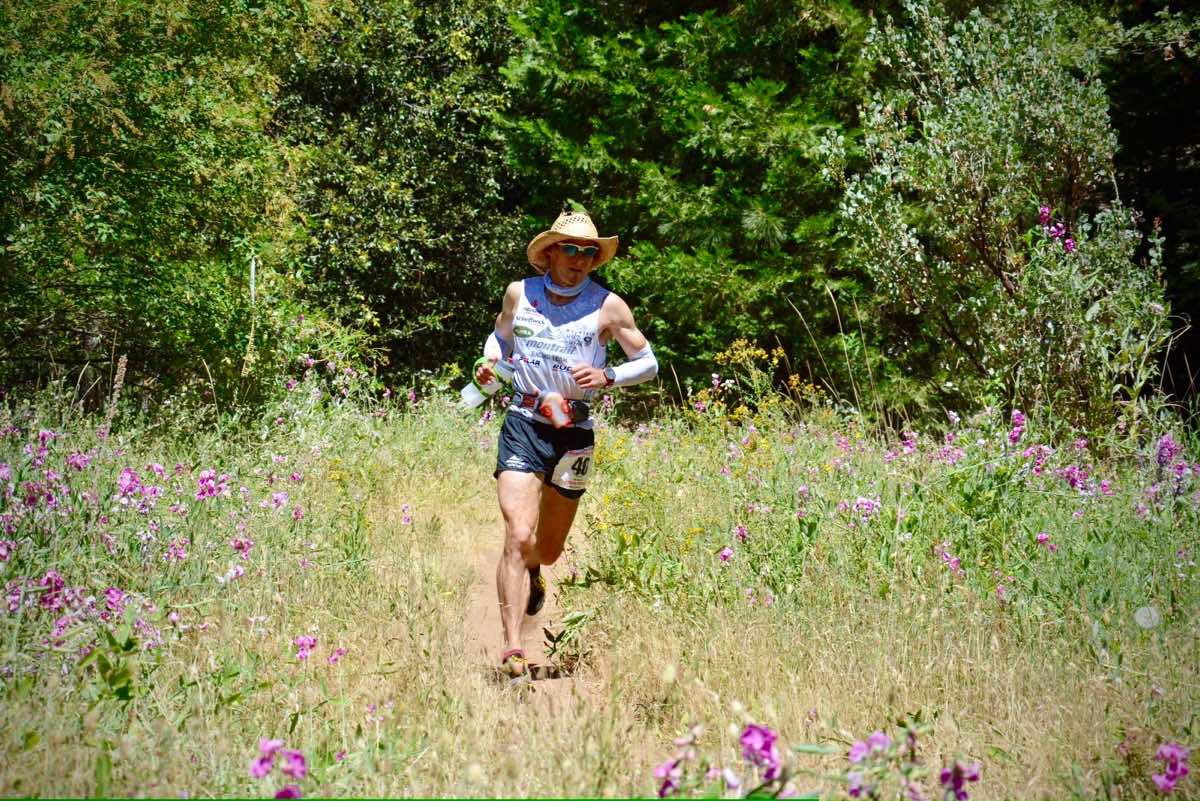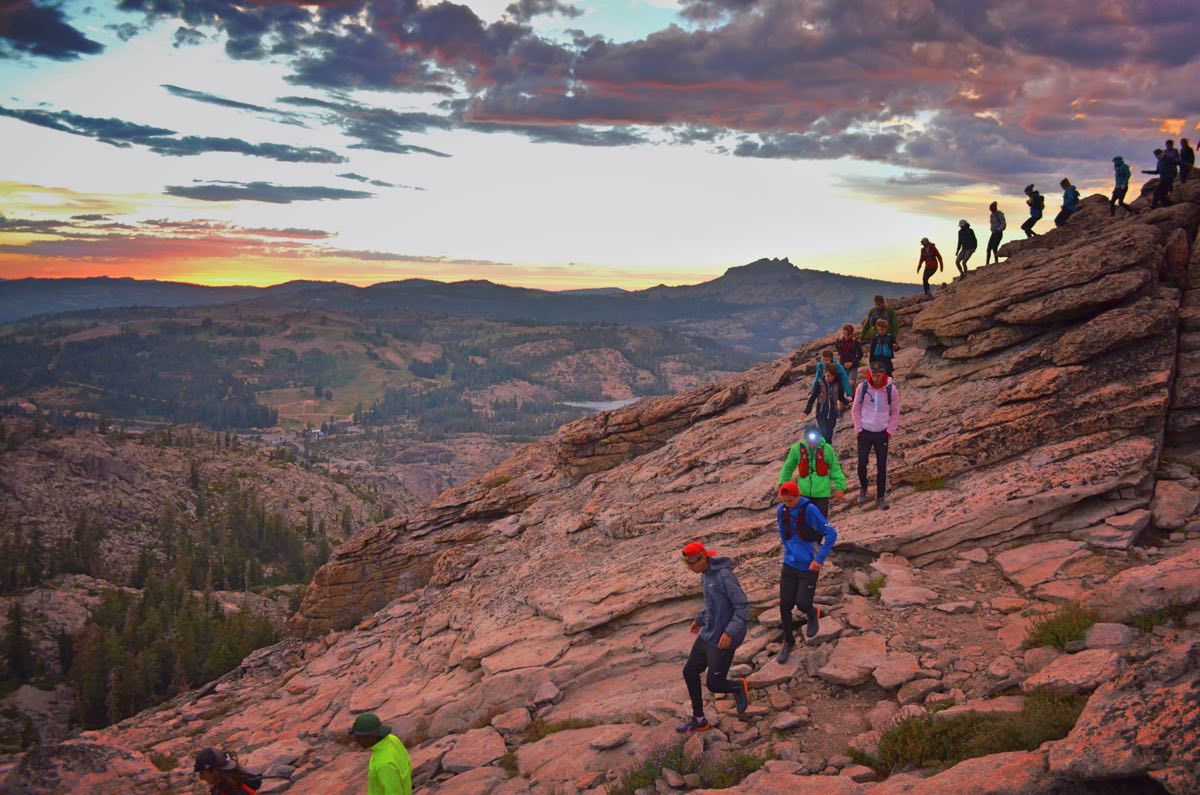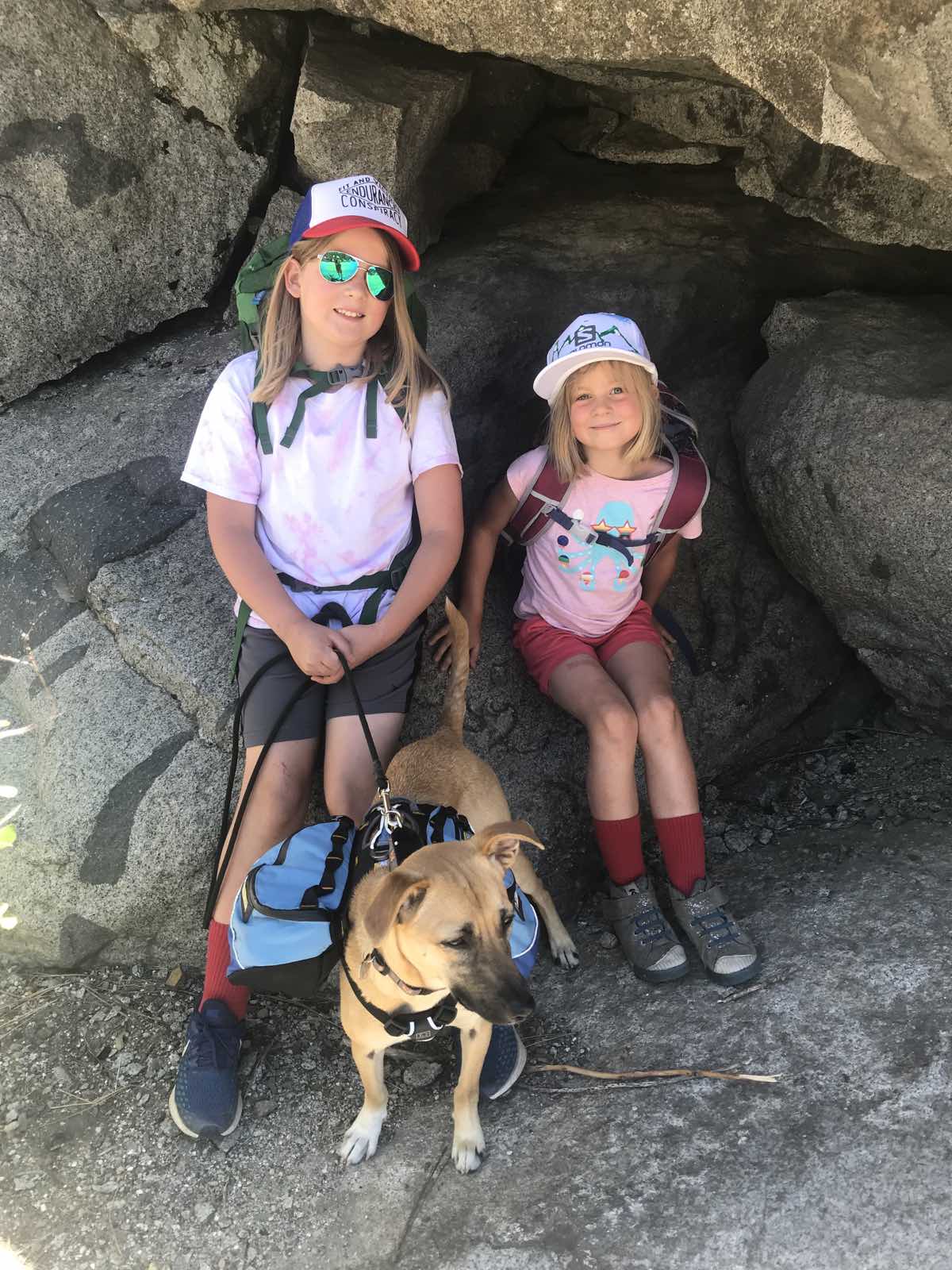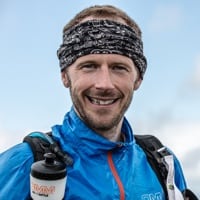In 2002, Max King made himself a deal. “After feeling burned out and taking some time off, I made a pact with myself when I started running again: ‘You can do this as long as you’re having fun.’ For me, keeping it fun means changing things up and trying new things.”
The 39 year old has had a lot of ‘fun’ since then. He’s had success on the track, on the road, at cross country, trail running, mountain running, skyrunning, short ultramarathons, 100 kilometers, long ultras (not as much, but not many can boast a top-five finish at the Western States 100), and even obstacle racing. He’s tried pretty much everything. And by success, we mean he’s been world champion. In more than one discipline.
“I can’t stick with one thing or I’ll get bored!” he chuckles. “There’s always something new to experience, some new challenge. I have friends who’ve been focused on the marathon for 10 years, on that one race. If that was me I wouldn’t be running anymore. It just wouldn’t be any fun.”
Nominative determinism can be a powerful thing. There’s Usain Bolt of course, British Romantic poet William Wordsworth, and German professor of psychiatry Jules Angst, to name just three. And then there’s Max King. So nominatively deterministic that it works for both his names.
This is a runner who pushes things to ultimate levels, and often ends up king of the hill. There’s a rumor, which Max will mischievously neither confirm nor deny, that he once pinned a race number to his bare chest. It won’t be a shock to those who note his penchant for facial hair, and that his favorite band is maximum metalists Metallica. “Mostly their early stuff, The Black Album.” He also likes a good doughnut, ideally apple fritter or buttermilk.
Nowadays he’s more likely to switch disciplines once he’s mastered one. But growing up, he was switching sports for the opposite reason. “I can’t remember if I was competitive-minded as a kid. But I just loved being out in the woods, running around. I tried soccer one year, but I was terrible at it. I tried football, but I was terrible. I tried basketball and I was terrible. I played baseball until seventh grade, but I was terrible. I started running in seventh grade and from then on I was a runner. I was really competitive when I found what I was good at. That changed things for me.”
Max grew up in Sacramento, California until the age of six, when his parents divorced. Then he moved to Oregon with his mom but continued to spend summers in California. In a 2015 iRunFar interview, Max said, “We were fairly outdoorsy. I’ve been camping since I was two or so. The first outing, however, resulted in a midnight repack of the car and a drive home because I wouldn’t stop screaming.”
In seventh grade, he was screaming with joy after winning the 3,000 meters at his first district meet. In high school, he quickly began to lead his cross country and track-and-field teams. In his junior and senior years, he placed fifth and sixth in the state at cross country.
In 1998, Max moved to New York and Cornell University, to study chemical engineering. In 2001 he qualified for the NCAA Division I Track and Field Outdoor Championships in the steeplechase. His steeplechasing success continued the next year, in 2002, where he placed ninth in the country and was an All-American.
That time training under then-Cornell coach Jerry Smith further helped form his approach to the sport. “It’s all in. Jerry taught me the value of hard work, which showed at college when I qualified for the national championships on both the track and in cross country. Two years prior to that, I thought there was no way that was possible. At any race, the guys at the front are putting in a lot of hard work.”
Max captained both the college cross-country and track teams. “I still attribute later success to those four years in college. It’s about endurance, sticking with things. I would move up without significant time gains because others dropped out, through injury, mental burnout, motivation, or other reasons. In endurance sport, if you stick with it long enough, you’ll get better and others will drop away.”
He graduated in 2002, but felt burned out. “It was four years of pressure and training volume, but also school–I had a pretty rough senior year of college. It was more a mental burnout. I was kind of done with running.” He took a year off.
Max had also met his future wife, Dory. “We knew each other for a couple of years from class and it gradually grew into something. I was moving back to the West Coast after college–I’d had enough of the East Coast. She was from upstate New York and I said, ‘I’m going west, come with me if you want to?’ Well, maybe it wasn’t quite said like that,” he chuckles.
He settled into life in Bend, Oregon, and a job as a chemical engineer. “I started dabbling in adventure races with friends. We’d bike, paddle, and run. It was recreational–being outdoors for 24 hours. It gradually grew into me missing that competitive aspect of sport and I started to get back into running.”
What a comeback it was. In Max’s first race, at the 2005 USATF National Club Cross Country Championships, he placed 10th. Two months later, in the same year’s USATF Cross Country Championships, he was 11th in both the 4k and 12k races.
He spent 2007 and 2008 training with the Oregon Track Club, aiming for the Olympic Trials in the steeplechase. The Trials went badly though and out of frustration he signed up for his first ultra, the Siskiyou Out Back 50k. “That race was just a week after Olympic Trials, so from my training I could do 20 miles fast on a road. The problem was that I didn’t know I had to eat! For the last seven miles I basically walked it in. It was really humbling. I didn’t know what a bonk was.” Yet he won.
And he won five of his first six ultras. “They were really painful! I didn’t know what I was doing. That was cool though, I could see there was so much to learn and I could get a lot better at it. It was a new challenge for me, showing me I didn’t know everything in this new discipline, which spurred me to try it even more. It took me another two years to finally have that 50k distance dialed in and get the nutrition and pacing right.”
Max likes a new running discipline. And often he’ll work on it till he’s mastered it. In 2011, he won the World Mountain Running Championships. “Everything aligned that day. It was perfect for me–I always loved cross country and it was a 12k course and a lot hillier than a golf course. And I was still fast from all the track stuff.” He cites it as his joint-favorite-ever running experience. The other came in 2014.
The 2014 IAU 100k World Championships were held on a hot night in Doha, Qatar. “I didn’t really think about wining either race. I just thought about doing my best,” he says. “That 100k was the most boring race I’d ever run, but also probably the smartest. I felt great and hit even splits on a flat but mentally brutal 5k loop. With that race I accomplished a lot of things for myself. I won and got a new American 100k record [of 6:27, a record which still stands]. So it’s been tough to find the next challenge in that discipline that’s motivating to me.”
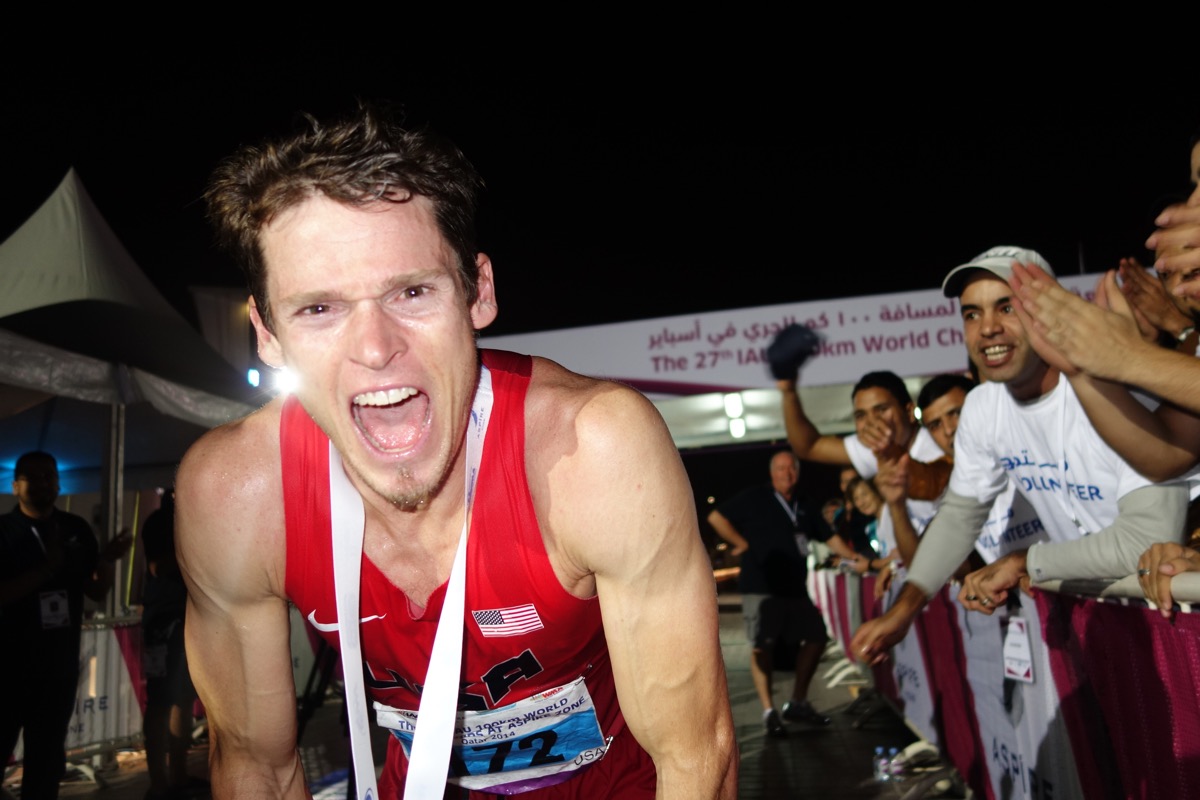
After setting a 100-kilometer American record at the 2014 IAU 100k World Championships. Photo: iRunFar/Bryon Powell
He was also excelling at obstacle racing, winning the Warrior Dash World Championships in 2014 and 2015. “Part of it was definitely the [$30,000] prize money. But it was just something fun to do. How I thought of it was as a cross-country race, with a few added benefits. It’s 5k and the obstacles are relatively easy–there wasn’t any heavy-lifting stuff. It was different, but it was in my wheelhouse. It benefitted me because of the strength I’ve got.”
In 2014 Max also tried his first 100 miler, the Western States 100. “I was off the front for 70 miles and it felt super easy! Going into it I’d had really good training and felt good on the day. I ran away from Rob Krar. But then Rob flew by me, running down to the river[, which is at mile 78]. The last 20 miles was a pretty good struggle. Whether I went out too fast… It’s always going to be a question, right? I would probably say, yeah. But I don’t think I would change anything on that day. It was a cool experience.” He ultimately finished fourth.
He would do it again. “I tried to this year, but that didn’t work out. [He dropped from the Black Canyon 100k due to injury, a race at which you could earn a Golden Ticket entry into Western States.] One hundred milers have an appeal, but not that much of one. That race has all the elements though: history, a following, I grew up in the area so I know the trails. It’s a special race for me. I will try that one again, though I don’t have a huge desire to do a lot of 100 milers.”
Having had a similar experience at his other 100 miler, the 2016 Leadville Trail 100 Mile [where he led for a long time before placing eighth], does he find the sport’s favoritism toward the distance frustrating? “Yeah, I think a lot of people out there didn’t consider me an ultrarunner until I’d run a 100 miler. It comes down to what you define as an ultra. To some it’s anything above 26 miles. To others it’s more ideological, you have to be out there for a long time–it’s never defined how much time. That doesn’t upset me, that’s fine. If people don’t consider a 50k an ultra, it is what it is, it doesn’t bother me. There are a lot of 50ks that have prestige and are great fun. And then there are the longer ones, and they’re just different.”
In that previously mentioned 2015 iRunFar interview, Max admitted to feeling pulled in two directions then, toward flatter and faster races as well as toward steeper mountain events. Does he still feel divided? “I do still feel pulled to different areas, but now it’s whether it’s something new to try or something old I didn’t totally nail. Western States is a good example. I have unfinished business there. On the flip-side that’s a 100 miler, and it’s really far. I enjoy the shorter distance, because I can race more. I love racing and I don’t have to spend six months focusing on a 100 and then take months off racing afterward. With a 20-mile race you can be racing again in a couple of weeks. You don’t have to increase the distance to increase the challenge. You can run things faster and that’s what I like, that’s how I get my pleasure, to run things fast. I like the Golden Trail Series, which are about running these big mountain races faster and that’s where I am right now.”
Max has also placed eighth at the Comrades Marathon, has a marathon PR of 2:14, a half-marathon PR of 1:03, a 10k PR of 29:01, and a 5k PR of 13:56. And he simply has too many race wins to list.
Max says he’s “trying” to be a full-time athlete, for Salomon, having quit previous jobs in engineering and as a shoe buyer because it got in the way of training. But last fall he took over the Bend Marathon with a business partner. “It’s one more piece of the puzzle. Everything I do is surrounded by running so it’s the logical move into something different but still in the running industry. It’s a ton of work. It’s bigger and more involved than I expected.”
When not running or working–he’s also a coach and is involved in summer trail running camps–Max is a family man, with a 10-year-old son and six-year-old daughter. “I try and get the kids outside, skiing, bike rides, hiking, which can sometimes be a challenge. You have to find ways to entice them along. I can’t tell them we’re going for a hike, that’s too boring, so we go geocaching.”
As ultrarunners get older there’s a trend toward longer stuff, but at 39 Max is still keener on the short stuff. He’s won the Mount Marathon Race and Broken Arrow Vertical Kilometer this summer, proving he can still mix it with the kids. And he’s keen on doing more Golden Trail Series (GTS) races. Just last weekend, he took 17th at Sierre-Zinal, a longstanding mountain race that’s been part of the GTS the last two years. “Changing things up is what keeps me motivated. I’ve had to really focus on getting better at [GTS-style races], a learning curve, a new challenge. Every couple of years, if I’ve had that new challenge to work on, to try and get better at, that’s been kinda’ cool. The new challenge is the motivation.”
He admits running is, “kinda’ like a job. I’m trying to get it in between 8 a.m. and 5 p.m. My passion goes up and down, depending on injuries!” Indeed, he’s been hampered by plantar fasciitis for 18 months and currently supplements running workouts with cycling. “When I get injured, the motivation wanes. As you get older you have to figure things out and maybe change things to still train at a high level. My endurance and speed is staying about the same, but I need a little bit more recovery time.” One of his benchmark workouts is 10 x 1 mile at 5:00-minute/mile pace with one-minute recoveries.
“Every single year the motivation and passion has gone up, a steady climb up. I just love getting up and going for a run now more now than I ever have. It’s surprising even to myself. That competitive fire is still there. I still want to get out there and race!” There’s little sign of that famously Max-imalist enthusiasm dwindling.
Call for Comments (from Meghan)
- What’s your favorite Max King performance from over the years?
- Have you raced with him? Can you share a story of sharing a race course with Max King?
